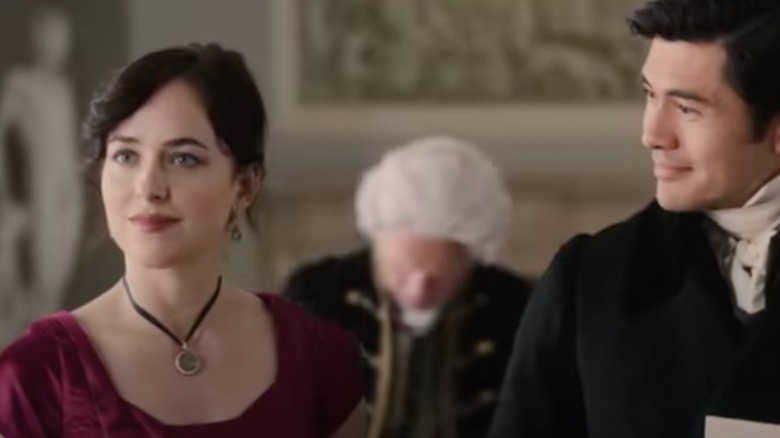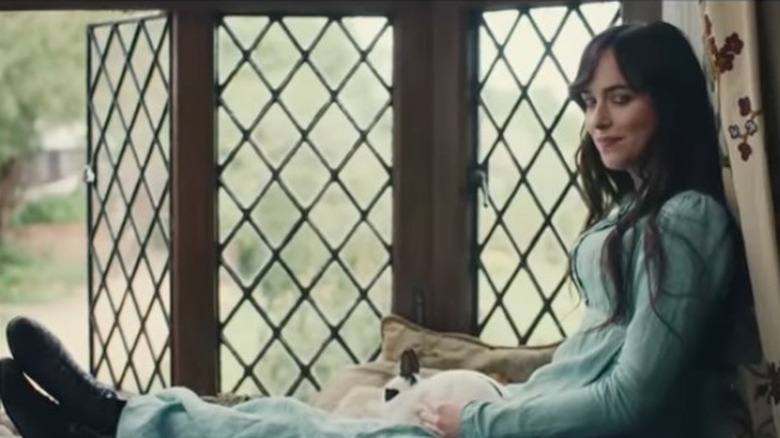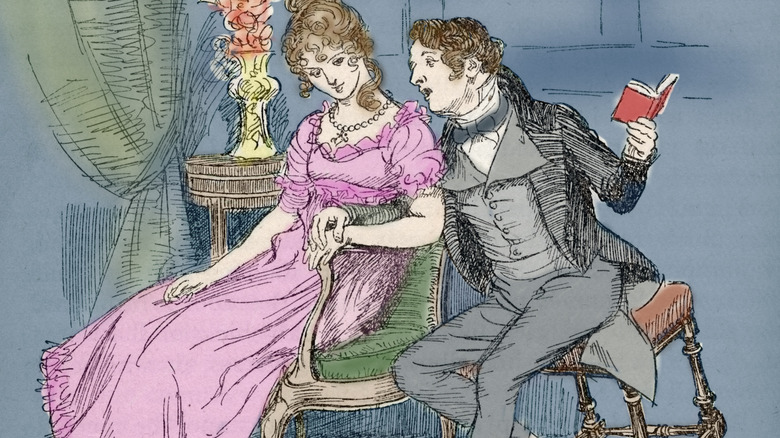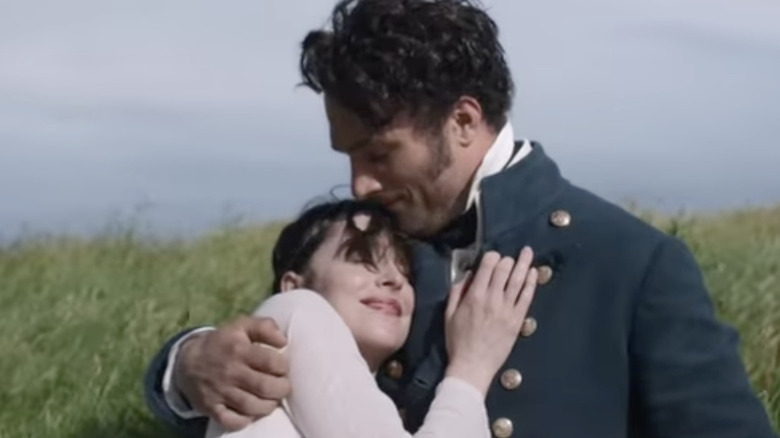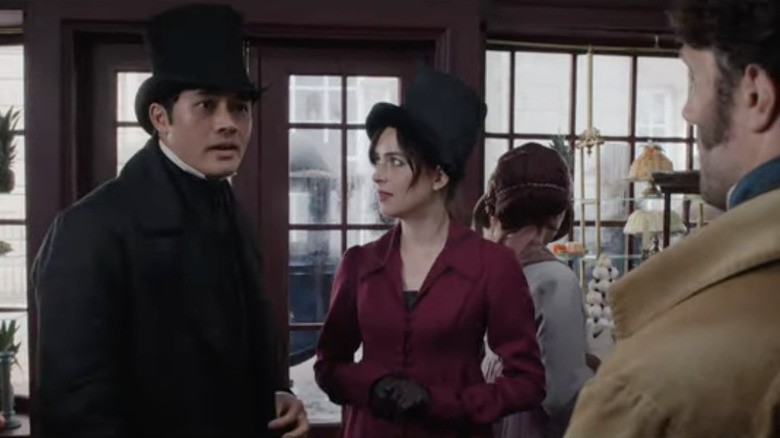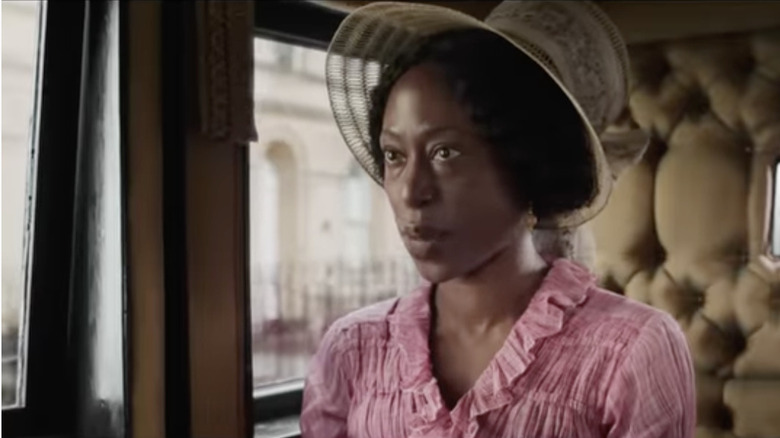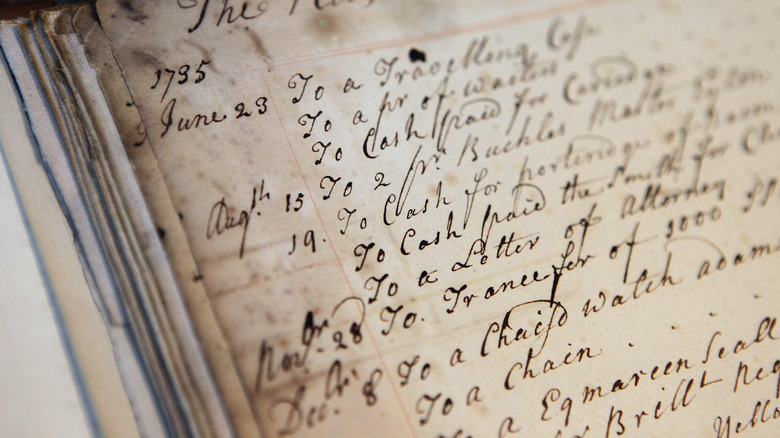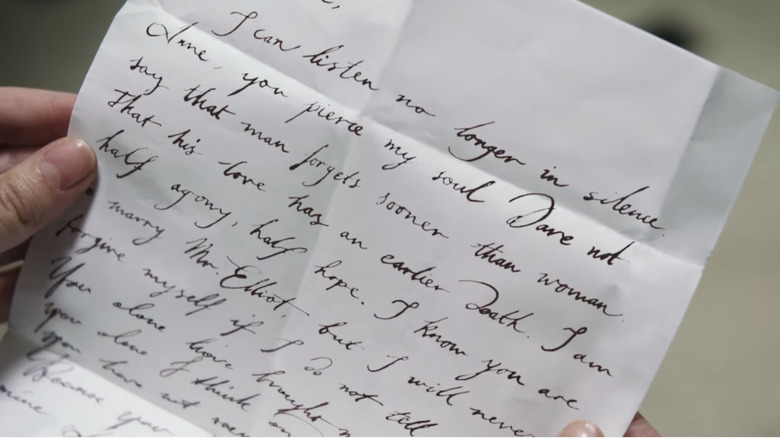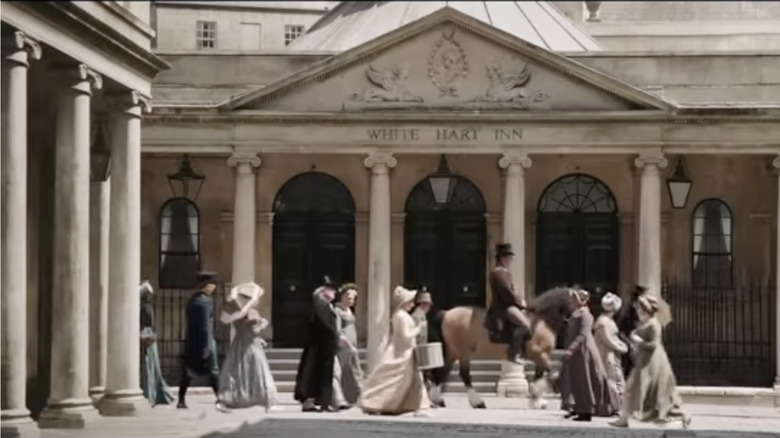What Netflix's 2022 Persuasion Got Wrong
Over the past few weeks, Netflix's latest contribution to Jane Austen movies, 2022's "Persuasion," has sparked a firestorm of controversy, as reported by Slate. Various criticisms have been lobbed towards the film and its creators, addressing everything from period-inappropriate costuming to overly altered and modernized dialogue.
The negativity has surprised some, especially in the context of the star-studded cast, which includes Dakota Johnson as Anne Elliot, Nikki Amuka-Bird as Lady Russell, Cosmo Jarvis as Captain Frederick Wentworth, and Henry Golding as a hunky Mr. Elliot. In the film's favor, "Persuasion" is far from the first Hollywood production to get a modern update. Previous works along these lines include 1995's tremendously successful "Clueless," a SoCal update of "Emma," and even 2001's "Bridget Jones' Diary," a loose reimagining of "Pride and Prejudice" (via The Indian Express).
That said, "Persuasion" takes many liberties when it comes to Jane Austen's last and most mature work. While it tries to capitalize on recent hits like "Fleabag" and "Bridgerton," even Dakota Johnson can't save this adaptation from its failings. Here's what you need to know about Netflix's most recent attempt at conquering Regency romance and what went wrong.
Anne Elliot's personality is unrecognizable
Unlike extroverted heroines like Emma Woodhouse and Elizabeth Bennet, Anne Elliot is an introverted and quiet heroine filled with slow-burning longing and internalized remorse over her past treatment of Captain Frederick Wentworth, according to Slate. Unfortunately, 2022's "Persuasion" transforms her into a sobbing, 1990s rom-com character who's clumsy, drunken, loud, and socially awkward.
As film critic Dana Stevens explains, "The novel's heroine Anne Elliot, a lovelorn, bookish, self-effacing woman on the cusp of spinsterhood, becomes an insufferably coy scatterbrain who speaks in 21st-century buzzwords." To add insult to injury, Dakota Johnson continuously breaks the fourth wall of filmmaking by staring at and directly addressing the audience through the camera. This turns the whole production into a romantic take on "The Office," and it doesn't fit Anne Elliot's personality or the subtle storytelling of the original novel, as reported by The Jane Austen Podcast.
This portrayal of Elliot as a highly independent — even rebellious — woman undermines the theme of the original work: the underrated and ignored heroine finding her own voice and making her desires known (via the Jane Austen Society of North America). Because Johnson starts out as a boisterous, outspoken woman, there's no room for her character to grow and find her own voice, per the Jane Austen Podcast. This also robs the story of much of its dramatic tension, and it renders improbable the idea that anybody could have talked her out of marrying Frederick Wentworth in the first place.
She gets a Hollywood upgrade in the looks department
In Jane Austen's novel, Anne Elliot is described as thin and faded, having lost her former bloom and youthful vigor, according to the Wondrium Daily. Nearing the age of spinsterhood, she has become a wall flower, especially in the company of her narcissistic sisters and overconfident friends. In essence, she's a Regency-era Cinderella, only with a godmother (Lady Russell) who emphasizes prudence over romance, per the Jane Austen Society of North America. This "fairy godmother manqué" leads to what Jane Austen terms the over-persuasion of the heroine.
Even Frederick Wentworth, upon seeing his former love again, declares her "so altered that he should not have known her again" (via Vox). Recent film adaptations of the story in 1995 and 2007 went to great lengths to cast mature heroines who could fit this bill while still exuding a quiet elegance, poise, and charm. Actresses who have played Anne Elliot with introverted appeal include Amanda Root and Sally Hawkins. These period dramatizations further downplayed their actresses' good looks with natural cosmetics and modest costuming.
But 2022's "Persuasion" presents a dolled-up Dakota Johnson who's predictably stunning. She's vivacious, young, and arresting — the antithesis of Anne Elliot. This might work for an adaptation of "Pride and Prejudice" or "Emma" with an outgoing lead heroine. But there's nothing about Johnson's portrayal that exudes bookish spinster who's spent years playing the part of an extra in the company of her overbearing, narcissistic family and friends.
Serious liberties are taken with the lingo
When adapting a novel written in 1817, it's understandable to freshen up some of the language, according to Pajiba. Other adaptations of "Persuasion" have added a contemporary polish to Jane Austen's original dialogue and succeeded brilliantly. Unfortunately, Netflix's attempt to sound fresh and modern in 2022's "Persuasion" leads to some unforgivably clumsy rewrites of the novel's original (and now iconic) lines.
For example, after Anne Elliot meets Captain Frederick Wentworth for the first time in eight years, Austen laments, "Now they were as strangers; nay, worse than strangers, for they could never become acquainted. It was a perpetual estrangement." These heartfelt words drive home the hopelessness of Elliot's situation. But the revamped version fails to strike the same chord, removing the last line about estrangement to say simply, "They were exes." For lines so well known to readers, this smacks of sacrilege. It's the equivalent of transforming William Shakespeare's "To be or not to be" into something like "Maybe or maybe not." The pathos evaporates.
Part of the problem with the update to lingo has to do with the creators' motivations. Instead of attempting to emphasize the original intent, their changes feel patronizing to the audience. It's as if they felt compelled to translate Austen's original language into something that modern audiences could comprehend. But Austen's far from Shakespeare. She doesn't need translation because her language is clear and accessible. This makes the word salad created by the filmmakers sound awfully clumsy.
Captain Frederick Wentworth is a watered-down Mr. Darcy
Captain Frederick Wentworth appears stripped of the vibrancy, dynamism, and charm of the original novel. According to the Jane Austen Society of North America, Austen described her hero as fearless, headstrong, warm, witty, and even reckless. But this doesn't get communicated into the portrayal of Wentworth by Cosmo Jarvis. Instead, Roger Ebert describes him as a "dreadful bore," also noting a general lack of chemistry between him and Johnson.
Sure, Captain Frederick Wentworth is also a wounded man who sneaks heartfelt glances Anne Elliott's way, but he's compelling, attractive, and sexy in a buttoned-down way. Sadly, the movie renders him a watered-down Mr. Fitzwilliam Darcy without any of the wit. Audiences are left wondering why this vivacious Anne Elliott has pined away for him for eight years. While it's hard to blame this portrayal on Jarvis, it still smacks of a travesty.
He's toned down to make even more room for Anne Elliot vibing "Fleabag." For anyone who's read the original novel or seen another adaptation, this approach marks an unforgivable subversion of the story. Part of the original tension comes from Elliot's perpetual relegation to the shadows. Her family marginalizes her, as do many of her friends (via Wondrium Daily). While a celebratory spotlight perpetually shines on Wentworth, Elliot falls into the role of a quiet companion seemingly forgotten in the crowd. The epitome of a shy Cinderella, her character arc towards boldness in the name of love is breathtaking. Netflix's "Persuasion" never achieves this.
Mr. William Elliot's portrayal lacks a major subplot
One of the biggest alterations of the original "Persuasion" storyline relates to Mr. Elliot, played by Henry Golding, per Bustle. In the Netflix version, Golding channels an impossibly handsome and charming villain with ease, making him one of the most fascinating parts of the movie. But the filmmakers lacked follow-through with his subplot, which eventually exposed Elliot as a fraud.
Nevertheless, the movie still paints Mr. Elliot as a man of obscure morals and motivations. He's seen cozying up to Anne Elliot and Mrs. Clay simultaneously. This still provides an excellent foil for Captain Frederick Wentworth who's driven by love rather than money. And the presence of Mr. Elliot also excites Wentworth's jealousy, leading to the recognition he still isn't over Anne Elliot.
But the more upsetting aspects of the original narrative are left out. This does a disservice to Jane Austen who was not only a renowned romance novelist but also a skilled social satirist. Sure, her social commentaries could get depressing at times, but they also put some skin in the game for her heroines who often faced destitute circumstances should a suitable marital match not follow. As critic Morgan Leigh Davies notes, "This adaptation ... erases all these uncomfortable complications, and instead presents a slick, meme-able version of the novel." This over-simplification also extends to the characterization of Mr. Elliot, Frederick Wentworth, and Anne Elliot.
Lady Russell's role is enlarged and recuperated
In Jane Austen's original book, both Lady Russell and Anne Elliot's family disapprove of Captain Frederick Wentworth's proposal. But the movie simplifies this narrative, portraying Russell as the sole impediment to the marriage, per the Insider. The film also leaves out the backstory about Anne Elliot's mother, Elizabeth Stevenson, whose unhappy marriage to Sir Walter negatively impacted her entire life, according to the Jane Austen Society of North America.
In the novel, Austen drops many clues indicating that Lady Russell's prejudice against Frederick Wentworth is based in the fear her goddaughter will make the same unhappy mistake as her mother by agreeing to a marriage based on mutual attraction rather than more practical considerations. Instead, the movie contains a scene with Russell comforting Anne about the broken engagement, not found in the novel. This makes Russell appear more likable despite being the sole meddler in Elliot's love life.
As Austen eloquently writes, "[Anne] had been forced into prudence in her youth, she learned romance as she grew older — the natural sequel to an unnatural beginning" (via the Jane Austen Society of North America). The tragedy of Elliot's broken engagement is palpable. But Austen also makes it clear that Lady Russell, though a fairy godmother gone wrong, nevertheless has Elliot's best interests at heart. Without Elizabeth Stevenson's back story, the melancholic nuance is lost. But the inclusion of the comforting scene goes a long way towards softening Russell's hard edges.
Anne Elliot has no impact on the family finances
When her family encounters financial difficulties, Anne Elliot steps in to help in Jane Austen's original novel, per The Jane Austen Podcast. This is one of many episodes that shows her to be a practical, intelligent, and self-assured woman who's undervalued by her family yet still goes the extra distance for them. But this episode is missing from the movie, which takes away from the audience's understanding of her character.
In Chapter Two of "Persuasion," Austen writes, "Every emendation of Anne's had been on the side of honesty against importance. She wanted more vigorous measures, a more complete reformation, a quicker release from debt, a much higher tone of indifference for every thing but justice and equity." This passage provides insights into Elliot's sensible and capable character, even in the face of difficulty. And it's no coincidence that Austen includes it early in her work to better acquaint the audience with her heroine's strengths.
Unfortunately, in their attempts to render Elliot a thoroughly modern and strong female protagonist, the filmmakers opted for rambunctious extroversion and drunken comedy. To make room for this, they left out genuine evidence of her good qualities. In USA Today's review of Kathleen Anderson's book "Jane Austen's Guide to Thrift," a quirky Regency-inspired guide to money management, Anne Elliot stands out as a beacon of good sense. She epitomizes the wisdom of staying out of debt. It's hard to find this in Dakota Johnson's drunken, loud rendition.
Mrs. Smith doesn't exist
In the novel version of "Persuasion," Anne Elliot visits a childhood acquaintance in Bath, Mrs. Smith. Mrs. Smith is ailing and widowed, but she still manages to give Anne vital information that dissuades her from a possible engagement to Mr. Elliot. Mrs. Smith is a woman of reduced means without any perceptible wealth, and friendship with her is genuine rather than based on meeting social obligations. Elliot faces scorn from her family, but she refuses to give in to their wishes, seeking friendship with Mrs. Smith despite their condemnation.
This relationship echoes the circumstances surrounding her engagement to Captain Frederick Wentworth. As a young naval officer of no great name or fortune, he faces the scorn of both Lady Russell and Sir Walter. At 19 years old, Elliot bends to her family's wishes, losing the love of her life. But now she's older and wiser and not about to let her family and friends dictate who she's going to keep company with.
Sadly, the movie leaves Mrs. Smith out entirely, according to Bustle. It robs audience members of the chance to see Elliot as a changed woman, no longer so easily persuaded by others. Instead, the conversation about Mr. Elliot's perfidious ways takes place between Anne Elliot and Lady Russell. While it provides yet another layer of reconciliation between the godmother and her Cinderella, it does nothing for Anne Elliot's character evolution. This decision also profits Mr. Elliot, whose full list of sins never gets disclosed.
Anne Elliot has a pet rabbit
While Anne Elliot's pet rabbit in the latest onscreen adaptation is adorable and provides the perfect companion for her narration of the film, the novel includes no such pets, according to the Insider. That said, it's a fun addition to the movie that alludes to ancient symbolism.
As reported by World Birds, in pre-Christian Europe, rabbits were often associated with Eostre, the goddess of fertility and spring. What's more, early Christians believed the animals could reproduce without physical contact. This led to associations with the Virgin Mary and their appearance in countless manuscripts, books, and paintings. Nevertheless, the inclusion of the rabbit pet still represents a departure from the original text. And it'd be wrong to just assume the lack of a pet was an oversight on Jane Austen's part.
In reality, she included animal references with strategic precision. Professor Susan E. Jones has observed, "Austen's animal references imply secret signals between author and contemporary reader and amplify the context in which they appear" (via the Jane Austen Society of North America). That said, even though we don't see the rabbit in the original text, the filmmakers stick to the spirit of Austen's animal references with the inclusion of a pet steeped in symbolic and romantic implications.
There's less tension in the love letter scene
Jane Austen's mastery of novel writing is in full effect in the penultimate scene of "Persuasion." She artfully ratchets up the tension until the satisfying climax found in Captain Wentworth's love letter, which "[Anne's] eyes devoured" (via Vox). There are many reasons this scene proves so effective. Austen synchronizes it with Anne Elliot's character arc and the realization that she should acknowledge her feelings and speak up before life passes her by.
The tension is further enhanced by Austen's decision to write the scene like the resolution of a mystery novel. It's similar to the moment when the detective lines up all of the suspects and then explains why they couldn't have committed the crime and who did. As Constance Grady explains, "In a murder mystery, it's for the killer to be revealed and face punishment; here, it's for the two lovers to recognize that they are both in love and reunite."
But the movie version of "Persuasion" lacks this tension for various reasons. For one, Anne reads the love letter directly into the camera (breaking the fourth wall), and this robs the moment of its emotional intensity and intimacy. We're left feeling like we're in on a joke rather than eavesdropping on a passionate and private disclosure. For another, the wording of the letter is altered, a risky move when it comes to one of literature's most celebrated romantic missives (via Jane Austen's World).
Persuasion takes on a decidedly youthful vibe
The creators of the latest film adaptation of "Persuasion" focused on giving the story a youthful glow in the hopes of introducing this material to a new generation (via the Los Angeles Times). Director Carrie Cracknell explained, "I hope we draw in new, younger audiences who perhaps know very little about Jane Austen ... and that a whole new generation will watch the adaptation, and then be drawn to read and fall in love with the book."
But while this is all well and good, "Persuasion" is the most ill-suited of Jane Austen's texts for youthful revision, according to the Wondrium Daily. In fact, the original novel represents the antithesis of such themes. "Persuasion" remains unflinchingly focused on aging, the passage of time, and the necessity of personal reflection. For these reasons, literary critics term it Austen's "autumnal novel."
"Persuasion" showcases Austen's most mature and quiet heroine. Instead of focusing on the decisions that shape life, it explores the quiet and heartbreaking after-effects of having to live with those decisions for a lifetime. These aren't trifling or comedic topics, and Austen addresses them with the exquisite insight of a seasoned artist. Unfortunately, the filmmakers' attempts to freshen up the material for a new generation render the original work as unrecognizable as the character of its heroine, Anne Elliot.
